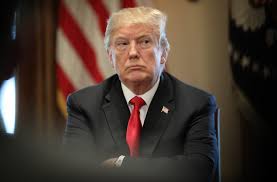A Trump trade war would hit red states hard

President Trump’s tariffs — and the trade war they could start — may hurt the very states that sent him to the White House.
Car plants from Michigan to South Carolina could pay more for the steel used to make engines and auto parts. Retaliatory action by the European Union could hurt bourbon distilleries in Kentucky and Harley-Davidson factory workers in Wisconsin.
Farmers across the Midwest would be a prime target for China, the biggest buyer of some American crops.
“Coming from an agriculture state that supported Trump, it’s certainly a disappointing development for Montana and the rest of rural America,” says Herb Karst, a grain farmer in Billings, Montana, and a representative of Farmers for Free Trade, an advocacy group.
“It just seems that agriculture is going to be paying the price for the protection of the steel and aluminum industries,” he said.
Related: Catch up on Trump’s tariff announcement
Trump said last week that he plans to impose a 25% tariff, or tax, on imported steel, and a 10% tariff on imported aluminum.
American manufacturers buy a lot of that imported steel and aluminum to make products including cars, kitchen appliances, baseball bats and medical equipment. Tariffs would raise their costs. Companies typically pass those costs on to their customers, which can cool sales and lead to job cuts.
The top five states that depend the most on manufacturing, based on employment, all voted for Trump in 2016: Alabama, Indiana, Iowa, Michigan and Wisconsin.
Some of these states also employ workers in the steel and aluminum industries. They could benefit from tariffs because their companies would face less foreign competition. And it may encourage more foreign investment.
Related: Trump is ready to fight a trade war with Europe
But overall, manufacturers would probably face higher costs. They would struggle against foreign competitors that don’t have the same trade barriers. For example, if a foreign-made car is cheaper and roughly the same quality, consumers abroad will likely lean toward Volkswagen over Ford, GM or other US car brands.
South Carolina is one red state that could be vulnerable in a trade war. The state has hung its economic hopes on manufacturing and trade. Those two industries make up about 30% of the state’s jobs, according to Labor Department figures.
Experts say the tariffs could cut two, drastically different ways.
On one hand, they could benefit the state by forcing foreign companies to increase investment in the United States, says Douglas Woodward, an economics professor at the University of South Carolina. The state has already positioned itself as an attractive hub for foreign investment. Samsung recently opened a plant there.
Trade barriers can encourage foreign companies to invest in the United States if the cost of exporting becomes too onerous and the companies still want to sell to Americans. When President Ronald Reagan imposed a limit on Japanese cars in the 1980s, Toyota and some other automakers moved production to Kentucky.
Related: Wilbur Ross defends Trump tariffs with a can of soup
But if other countries retaliate against Trump’s tariffs, the benefits could be negated for states like South Carolina.
“It could really have a big impact on a trade-dependent state like ours,” Woodward says. “That’s the big risk here, we could get retaliation, we could get a trade war … that could be damaging.”
One in every 11 jobs in South Carolina depends on the state’s four seaports, where shipping containers move in and out, according to the South Carolina Ports Authority. In total, 187,000 South Carolina jobs depend on trade at the ports.
On the other side of the state, the largest BMW plant in the world employs 9,000 workers in Spartanburg. BMW is the state’s largest manufacturer by employment — and it exports more cars from the United States, by value, than any other auto company.
Related: What is a trade war? And all your other questions answered
Boeing is another major employer in South Carolina, with roughly 7,500 employees in North Charleston. It uses less aluminum for its new plane models than it used to, but Boeing sells a lot of planes overseas. More than half its revenue comes from abroad, and that could be subject to retaliation. Another alternative is that airlines and governments could buy planes from European makers such as Airbus.
Trump has not exempted any countries from the tariffs. Boeing’s top foreign markets are China, Canada and Japan. The first two have promised to retaliate if Trump goes through with the tariffs.
South Carolina also produces soybeans, and China is the No. 1 buyer of American soy. The crop stands to be one of the first targets if China and other countries retaliate. And it’s not just soy farmers who will feel it.
Karst, the grain farmer in Montana, doesn’t grow soy, but he’s worried that soy will be targeted. If Americans can’t sell soy to China, he argues, that will create a glut in the United States. And he says a glut of one crop tends to lower prices for others.
“That’s just devastating,” says Karst, 69. As for Trump’s tariffs, they’re “counterproductive to his stated goal of making sure America wins.”
